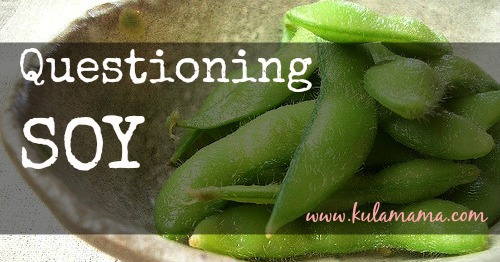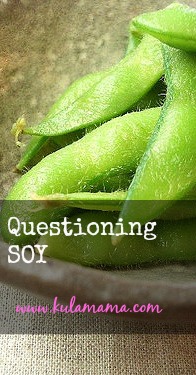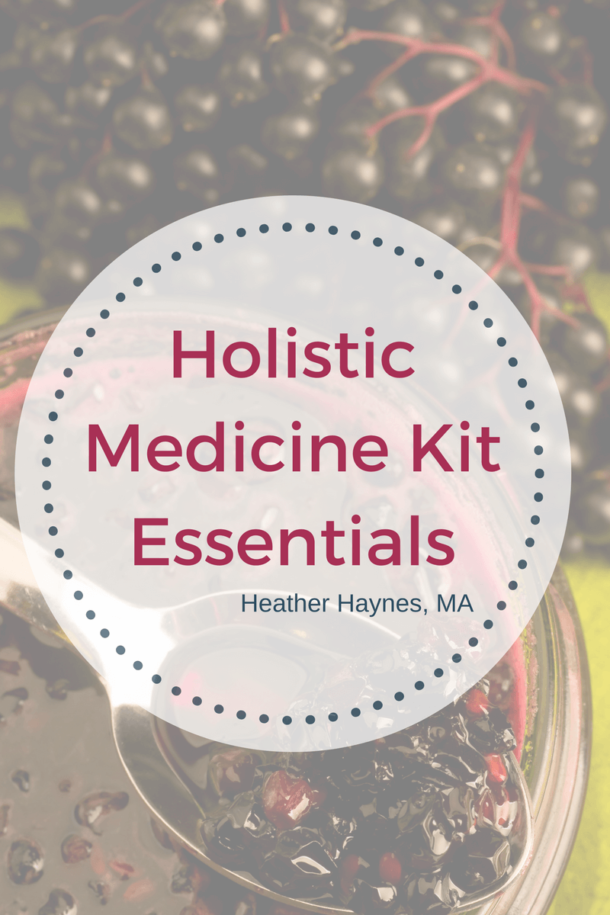Questioning SOY.
I can’t tell you how many people ask me about soy. I should start a 1-800-soy hotline for the number of times I get asked to explain the mystery surrounding the soybean. Should you give soy milk to your daughter as a substitute for milk? Should you eat soy products yourself? How about soy infant formula? (Sidebar: skip to the last paragraph if you need to know about soy infant formula ASAP.) Once parents start reading labels they learn soy is in a BAZILLION products (hello soy lecithin!). Some parents wonder how much soy is too much soy? For those of you who never think about soy, I’m sorry I’m about to rain on your parade.
How Soy Wrecked My Health
I have a very personal relationship with soy. No, not in a good way. For ten years I ate tempeh (a fermented form of the soybean) nearly EVERY DAY before I learned that soy was literally making me sick. I formed a severe food sensitivity to soy (not an easy one to have as soy shows up in everything) and started having anxiety symptoms as a result of my self imposed sensitivity. Easy to fix, right? STOP EATING SOY. One problem: I didn’t know soy was causing my symptoms and spent the better part of 2 years trying to figure out why I was short of breath and had heart palpitations 24 hours a day! I went to see my primary care physician demanding an EKG because I was SURE I was having a heart attack. He said, “no, you are having an anxiety attack…here’s a prescription.” Unsatisfied, and unwilling to take a pill, I went to see another doctor to get to the bottom of my condition. He said, “why is it hard for you to accept that you might be an anxious person who needs medication for the rest of your life?” Where’s the bedside manner people? A year later I entered graduate school and started studying nutrition. I learned that food allergies often show up as anxiety symptoms. To make a long story short(er), I FINALLY discovered soy was the problem after some testing and a little investigative work on my own. As soon as I took the culprit out of my diet…the symptoms disappeared OVERNIGHT. No joke.
Oh, soy.
Modern Soy (not the kind our ancestors ate)
The soybean has both a good reputation and a bad reputation. The bad reputation is more deserved, but let me explain before you start banning soy sauce from the house. Traditionally in Asia, soy products were consumed in very small quantities and in a fermented state. Tempeh, miso, natto and soy sauce are all examples of fermented soy products. The process of fermentation is necessary to remove the high levels of naturally occurring toxins found on the soybean. These toxins (including phytic acid– a toxin that blocks nutrient absorption in the body) need to be removed before the soybean can be digested properly.
Modern soy products (the kind we see if supermarkets today) are not fermented. Vegetarian soy protein substitutes, energy bars, tofu and soy milk are all great examples of modern soy products. Because these products are not fermented, they still contain high levels of toxins. Not only that, they are also highly processed foods.
Soy products have a healthy reputation due to the heavily marketed isoflavones (also called phytoestrogens) contained in the soybean. Isoflavones are estrogen-like compounds that act as a pesticide for the soybean in nature. Isoflavones are the hardest part of the soy mystery to crack. Are they healthy or not? Unfortunately, they aren’t as healthy as we have been led to believe by soy supporters. The soy industry makes billions of dollars annually so there are more than a couple interested parties in this SOY scenario. Soy critics cite research that finds isoflavones are actually damaging to our health. Studies have shown isoflavones can simulate the growth of cancer cells, significantly alter a woman’s hormone balance and menstrual cycle (even preventing ovulation), and lead to hypothyroidism. Research studies using mice found that soy isoflavones caused infertility, reproductive problems, and thyroid disease. Additionally, women who have estrogen sensitive breast tumors should NOT eat soy. Research studies have shown that soy can stimulate the growth of estrogen sensitive tumors.
So why is the soybean considered healthy? Well, organic soybeans (those not genetically modified, however, 90% of soy crops come from genetically modified seeds so good luck!) contain protein, essential fatty acids, fiber, and lecithin. However, these health benefits can only been absorbed by the body if the soy is fermented first. And even then perhaps the risks of soy outweigh the benefits because fermented soy still contains isoflavones.
The Dangers of SOY PROTEIN ISOLATE (SPI)
But wait, there is even more to the SOY saga….. soy protein isolate. You know those energy bars we love (Luna bars, Power Bars, Cliff Bars, etc)? They contain something called soy protein isolate (SPI). SPI is made using a high heating process that denatures many of the healthy proteins in soy. Also during processing, nitrates (carcinogens) and the toxin lysinoalanine are formed. As the final kicker, many flavorings including MSG are added to cover up the “bean” flavor. Sounds YUMMY. SPI actually depletes the body of nutrients, so it could be considered an anti-nutrient! Oh, and SPI contains aluminum. Even more alarmingly mamas, SPI is found in soy infant formulas.
Why are we Feeding Infants SPI?
Soy infant formula is often offered to babies who have a hard time digesting milk proteins. Soy protein isolate is allowed in small quantities, however, SPI isn’t the only ingredient under scrutiny. Soy critics are also wary of infants receiving soy isoflavones because their bodies are so small. A 1992 Swiss study found that an intake of 100 mg of isoflavones (2 cups of soy milk) had the estrogenic effect of one birth control pill in adults. Using this finding as our barometer, the isoflavones found in soy infant formula equal 4-5 birth control pills a day when accounting for the average amount of formula an infant drinks. This is known to cause thyroid problems in babies, but what about the hormonal effects in the short and long term? For both males (low testosterone?) and females (early puberty?)?? The full circle of influence is not yet known. As a mom of a young boy, soy infant formula sounds like a science experiment to avoid.
Bottom line on SOY.
So what’s my advice to moms who ask me about soy? I tell them to think of modern soy like a can of Coca Cola. You know it tastes yummy…. but it also has the ability to clean the grout in your bathroom shower. So it’s probably best if modern soy products (the unfermented variety) serve as a once and awhile indulgence. What about fermented soy? Everything in moderation I say.
For “all you ever wanted to know about soy in a brochure” go to the Weston A. Price website and click on the Soy Alert Brochure. They also have a great article about how to recover from soy allergies. As a recovering addict myself, I found it very helpful.



